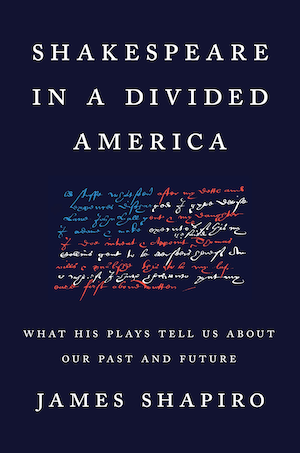By Louis J. Kern
“We are a reasoning race,” Mark Twain observed sardonically, but “we always get second hand our notions about systems of government . . . and our preferences in the matter of religious and political parties” (Is Shakespeare Dead? [1909]). Indeed, for Americans the primary fonts of our most cherished beliefs and convictions are the Bible and the works of Shakespeare.
As a New Historicist critic, Shapiro maintains that the Bard’s work must be understood within the intellectual, social, and political context of its composition but that its reception over time is affected by changing beliefs and mores; as times change so does the relevance and meaning ascribed to a text. In this most timely volume, Shapiro surveys the ways in which Shakespeare has been instrumentally used to address identity construction and fraught social issues relating to sexuality, gender, race, class, and national origin over the last century.
Geography, too, could condition dramatic reception—J.Q. Adams condemned Desdemona for marrying a black man in 1835, while Othello (in blackface) was widely popular in the antebellum South. Issues of gender identity in the 1840s proscribed male performance as Juliet as subversive of macho, aggressive masculinity while lionizing Charlotte Cushman’s more sensitive, gentle male Romeo. The Astor Place riots (1849) pitted elite Astor Opera House patrons against the Bowery Theater’s working class, and their respective Shakespeareans—Englishman William Macready, who gave a nuanced, thoughtful performance of Macbeth, and American Edwin Forrest, whose performance was violently energetic. Rioters were motivated by anger at the 1% and anti-abolitionism, and nativist agitators used ownership of Shakespeare to drive class warfare in New York City.
The Tempest was appropriated by immigration restrictionists, who argued that Caliban was a barbarian and that Shakespeare projected the extermination of the aborigines to preserve the Anglo-Saxon race in the New World. This interpretation meshed neatly with Madison Grant’s The Passing of the Great Race (1916) and the Immigration Act of 1924.
With post-war female independence butting against a concerted effort to drive women back into domestic roles, a renewed battle of the sexes ensued, manifested in a rising divorce rate. The Taming of the Shrew (popularized by Lynn Fontaine and Alfred Lunt) and its musical translations (Broadway, 1951; film, 1953), gave rise to a vogue of spanking women in popular media and encouraged rough physical treatment of women.
In recent times, Shakespeare has served satirical social commentary—Tom Stoppard’s skit Two Gentlemen from Queens (1999) about the Weinstein brothers plot to produce Monica Lewinski’s fantastical baby for the cover of a tabloid—and serious political debate—the Public Theater’s modern-dress production of Julius Caesar (Shakespeare in the Park, 2016) provoked by Stephen Greenblatt’s query: “How could a great country wind up being governed by a sociopath?” (New York Times, Oct. 9, 2016). Despite Oskar Eustis’ intent to spark political dialogue, right-wing media subverted the play as an imaginary enactment of the assassination of Trump, actively protesting at its performance and demanding its censorship.
Shapiro’s elegant, lively volume is bookended by a detailed discussion of the Delacorte Theater production of Julius Caesar. He makes clear that Shakespeare is often misunderstood and grossly misused—Steve Bannon’s use of Julius Caesar to suggest the assassination of establishment apparatchik Mitch McConnell—but that he remains essential to a contemplative, creative response to a dangerously polarized cultural and political present. To our electronically overheated moment, Shakespeare offers a warning and appeal to careful attention and deliberation: “Rumor is a pipe/Blown by surmises, jealousies, conjectures,/And of so easy and so plain a stop/That the blunt monster with uncounted heads,/The still-discordant wavering multitude,/Can play upon it” ( Henry IV, Pt. II, Induction.15).
Louis J. Kern (ΦBK, Clark University) is professor emeritus of history at Hofstra University. Hofstra University is home to the Omega of New York chapter of Phi Beta Kappa.




